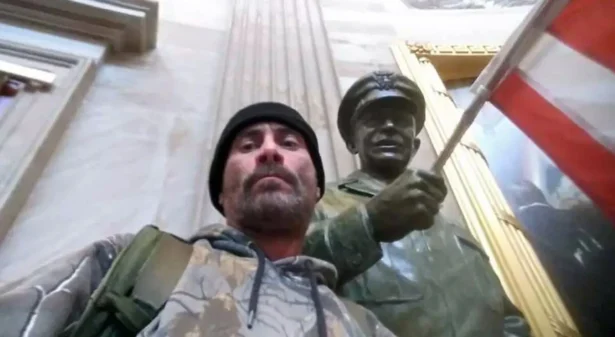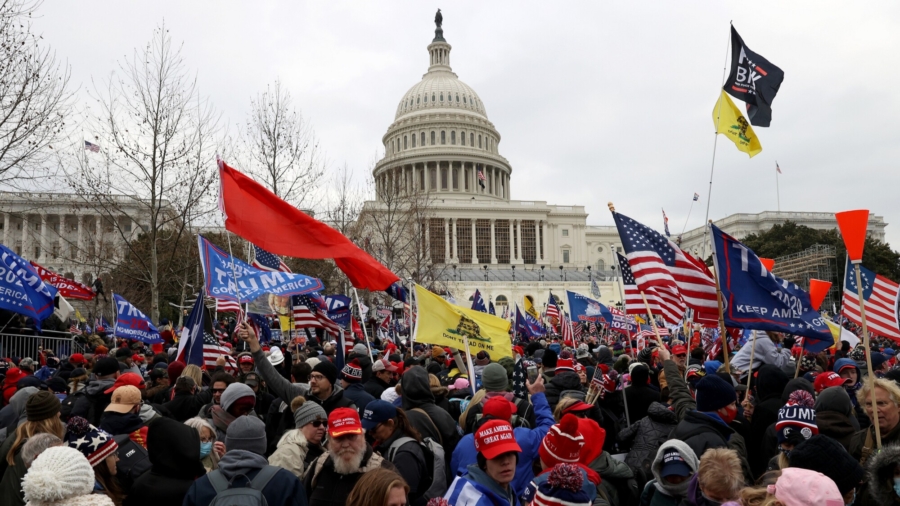If the U.S. Supreme Court strikes down the Department of Justice’s controversial use of an evidence-tampering law to prosecute Jan. 6 protesters, federal prosecutors indicate they would likely seek longer jail time on other charges to make up the difference.
In a March 19 court filing in the case of Anthony Robert Williams, 48, of Southgate, Michigan, the DOJ said Mr. Williams should not assume his prison term would be lessened if the Supreme Court strikes down his lone felony charge.
Under such a DOJ approach, prison time on other charges could be increased or prison terms could be set to run consecutively instead of concurrently, meaning the elimination of a felony count might not cut down prison time or result in release.
A judge would decide in a re-sentencing hearing.
Defense attorney William Shipley called the suggested approach “legally illiterate,” saying it comes from a DOJ that already has a “ridiculous” practice of asking “for sentencing calculations that are typically double or more what the courts have ended up imposing in the vast majority of cases.”
Mr. Williams filed a motion on Feb. 27 seeking release from prison while the Supreme Court considers whether a corporate fraud statute can be used to punish defendants for allegedly obstructing Congress’ ceremonial counting of Electoral College votes on Jan. 6, 2021.
The obstruction of an official proceeding law—Title 18 U.S. Code §1512(c)(2)—carries a maximum 20-year prison term. It is the most commonly charged felony in Jan. 6 cases, used against more than 350 defendants and counting.
The obstruction at the heart of the charge was the hours-long delay of Congressional debate on Jan. 6 caused by violence at the Capitol.
In June 2022, a District of Columbia jury found Mr. Williams guilty of felony obstruction and four misdemeanors: Entering and remaining in a restricted building or grounds; disorderly and disruptive conduct in a restricted building or grounds; disorderly conduct in a Capitol Building; and parading, demonstrating, or picketing in a Capitol building.
U.S. District Judge Beryl Howell sentenced Mr. Williams to 60 months in prison, a term he began serving on Oct. 18, 2022.
Supreme Court Hearing
The Supreme Court will hear oral arguments on April 16 in Fischer v. United States, a challenge to the use of §1512(c)(2) brought by Jan. 6 defendant Joseph Wayne Fischer, 57, of Jonestown, Pennsylvania. A decision on the issue is expected by late June.
In a motion opposing Mr. Williams’s release, the DOJ said he “cannot show that there is any likelihood that the outcome in Fischer will result in a reduced sentence to a term of imprisonment less than the total of the time already served plus the expected duration of the appeal process.”
Assistant U.S. Attorney Monika Jasiewicz said if Mr. Williams’s felony charge falls away due to Supreme Court action, the DOJ “likely” would seek increased prison on the other charges, asking a judge to make prison terms run consecutively rather than the standard concurrently.
Ms. Jasiewicz said release from prison is only allowed if an appeal “raises a substantial question likely to result in reversal of all counts on which imprisonment is imposed.”
Mr. Williams could also not establish by “clear and convincing evidence” that he is not a danger to the community, Ms. Jasiewicz wrote.
“Williams made prolific posts on social media that included language this court described as ‘totally militaristic’ and ‘downright chilling,’ expressing his belief that the 2020 presidential election was rigged, urging that Democrats be hung for treason, and calling for war,” she said.
Mr. Shipley, a former federal prosecutor who has represented more than 50 Jan. 6 defendants, said while the DOJ’s approach is “legally illiterate,” that “is not going to stop them from trying.”
“When DOJ and the lower court have been told they’ve erred, their response is not supposed to end up with a workaround that gets them back to the same place that their errors took them,” Mr. Shipley wrote on the social media channel X. “DOJ may want that—too bad.”
While there are circumstances where the so-called “stacking” of consecutive prison terms is appropriate, Mr. Shipley said: “I do not think these cases fit.”

Mr. Williams’s attorney, Benton Martin, wrote that his client “has already served the entirety of his misdemeanor sentences. If his appeal succeeds, he will be eligible for immediate release.”
Because the Supreme Court granted a writ of certiorari in the Fischer case, there is no longer a dispute whether Mr. Williams’s own appeal of the §1512(c)(2) charge poses a “substantial question,” Mr. Martin wrote.
Mr. Williams fully complied with pretrial release conditions for more than 18 months and self-surrendered for his prison term. Mr. Martin said this constitutes “clear and convincing” evidence that he won’t flee or be a danger to the community.
Mr. Williams hopes to return to being the primary caretaker for his mother, who suffers from obstructive pulmonary disease and has mobility issues, Mr. Martin said.
On Jan. 10, U.S. District Judge Amit Mehta ordered the release of Thomas B. Adams Jr., who was serving a 14-month sentence for obstructing an official proceeding and entering and remaining in a restricted building or grounds.
Judge Mehta said that without the obstruction felony conviction, Mr. Adams’s sentence would have been in the range of two to eight months.
Judge John Bates issued a similar ruling on Jan. 11, ordering that Alexander Sheppard be released from prison on May 2, after he has served six months behind bars.
Mr. Sheppard was sentenced in September 2023 to 19 months in prison on four misdemeanor counts and a single felony charge: obstruction of an official proceeding.
From The Epoch Times

